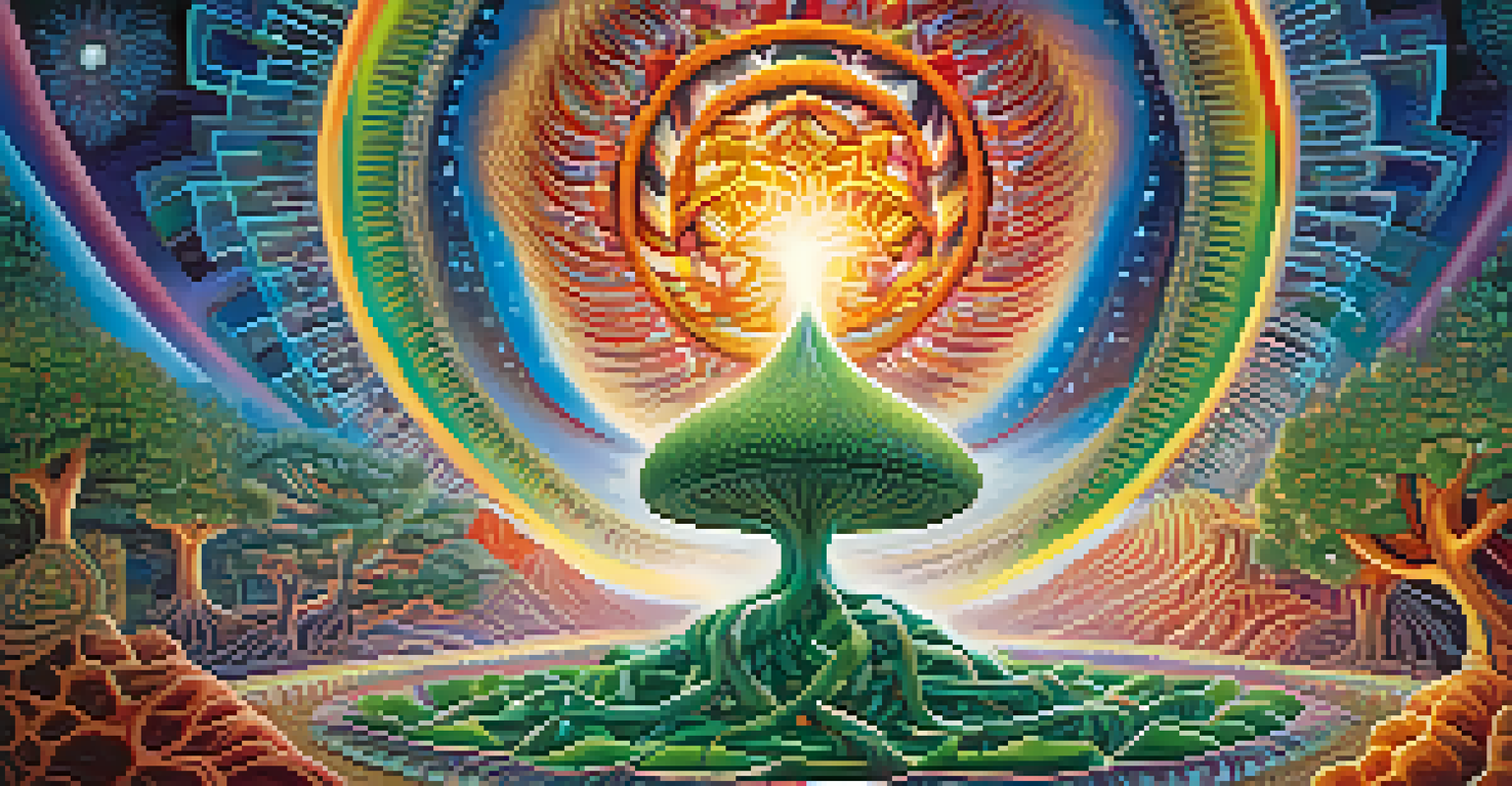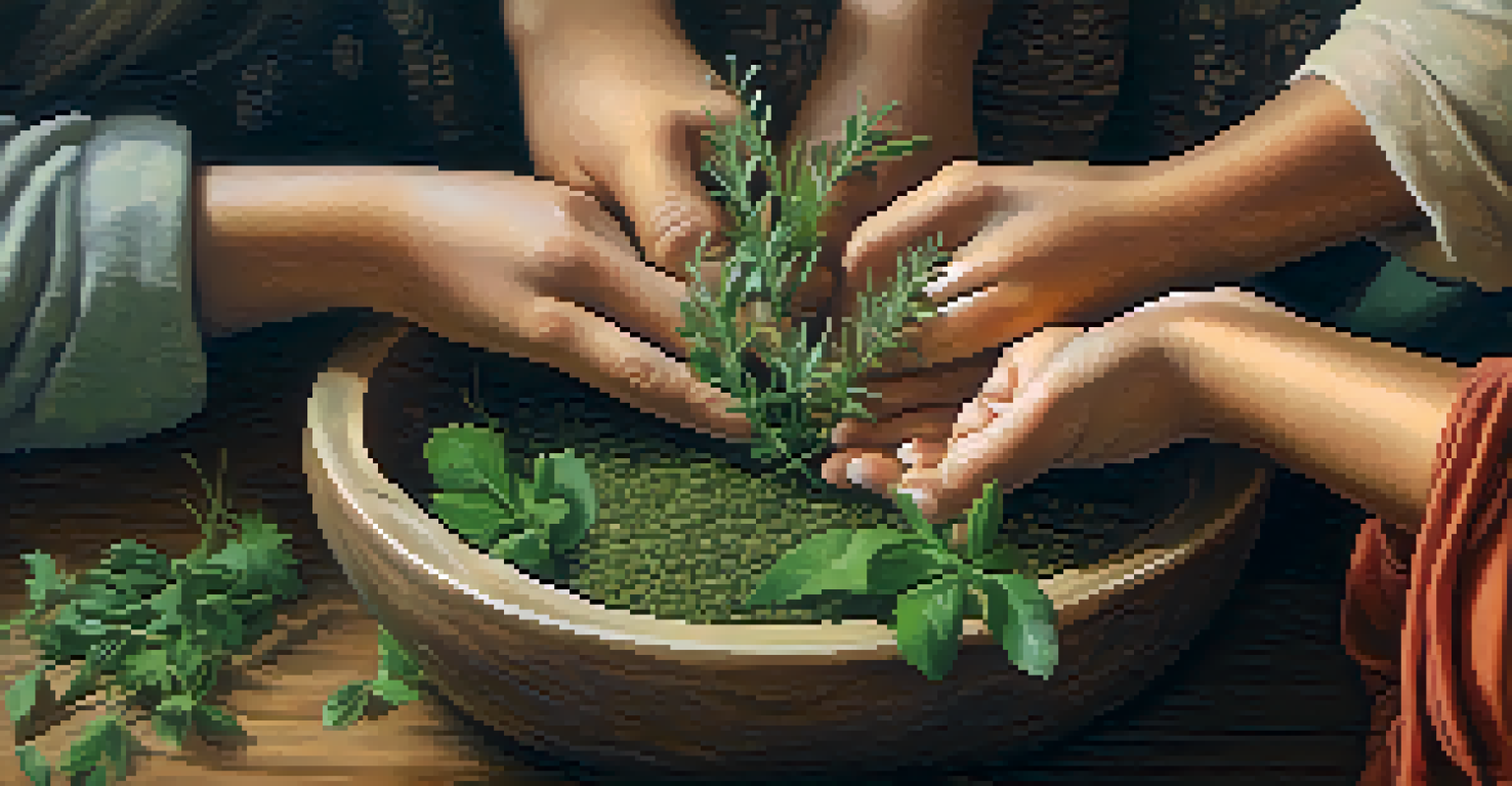The Role of Entheogens in Racial Justice Movements

Understanding Entheogens and Their Historical Context
Entheogens are substances that are often used in a spiritual or religious context to induce altered states of consciousness. Historically, various cultures have utilized these plants and compounds to connect with the divine or to foster communal bonding. Examples include ayahuasca in Amazonian tribes and peyote among Native American communities, both serving as tools for introspection and healing.
Entheogens have the potential to heal the wounds of systemic oppression and inspire a collective sense of purpose.
In the context of racial justice, understanding the historical use of entheogens can shed light on their role in promoting awareness and social change. Many marginalized communities have turned to these practices not just for personal healing but also as a means of collective empowerment. This rich history provides a backdrop for examining their relevance today.
As we delve into the modern resurgence of interest in entheogens, it's essential to recognize how they can help individuals reconnect with their roots and culture. This reconnection can empower communities, fostering resilience and a deeper understanding of their struggles against systemic injustices.
The Therapeutic Benefits of Entheogens in Healing Trauma
Entheogens have been shown to facilitate profound emotional healing, particularly for those who have experienced trauma. For many individuals within racialized communities, historical and personal traumas can create a deep sense of disconnection and pain. Substances like psilocybin and MDMA have been researched for their potential to ease such trauma, helping users process difficult emotions and experiences.

Additionally, these substances can promote feelings of interconnectedness and empathy, which are crucial for understanding the collective nature of racial struggles. By fostering a sense of unity, entheogens can encourage individuals to engage more deeply with social justice issues and support their communities. This transformation can be vital for personal and collective healing.
Entheogens Enhance Healing and Unity
Entheogens facilitate emotional healing and foster interconnectedness, empowering individuals and communities to engage deeply with social justice issues.
Moreover, entheogenic experiences often lead participants to re-evaluate their worldview, challenging ingrained biases and fostering compassion for others. This shift in perspective can inspire active participation in racial justice movements, as individuals recognize their role within the larger societal framework.
Entheogens and Community Building in Activism
The use of entheogens in group settings can create a unique bonding experience among participants. Shared journeys often lead to profound discussions about identity, culture, and systemic oppression. This communal aspect can strengthen relationships and foster solidarity among activists, which is essential in any movement for change.
True appreciation of culture involves understanding, respecting, and honoring the traditions from which these practices arise.
When groups come together to explore these substances, they also engage in collective healing, which can be particularly beneficial for communities affected by racial injustice. By addressing shared traumas, these gatherings can empower participants to work together more effectively towards common goals. This sense of unity can galvanize efforts and inspire deeper commitment to the cause.
In essence, the communal use of entheogens can serve as a catalyst for organizing and mobilizing, making them a valuable tool in the fight for racial justice. These experiences can create a sense of belonging and purpose, reinforcing the idea that everyone has a role in advocating for change.
Cultural Appropriation vs. Cultural Appreciation
As interest in entheogens grows in mainstream culture, the line between cultural appropriation and appreciation becomes increasingly relevant. Many entheogens have deep-rooted significance in the traditions of Indigenous peoples, and their commodification can lead to exploitation. It's essential to navigate this landscape thoughtfully and respectfully.
Cultural appropriation occurs when elements of a marginalized culture are taken out of context and used without understanding their significance. This can diminish the cultural heritage and spiritual practices of those communities. Therefore, educating oneself about the origins and meanings of these substances is crucial for anyone interested in incorporating them into their lives.
Cultural Respect is Crucial
Navigating the line between cultural appropriation and appreciation is essential to honor the traditions of Indigenous peoples while incorporating entheogenic practices.
On the other hand, cultural appreciation involves acknowledging and respecting the traditions of those who have historically used entheogens. By fostering respectful dialogue and collaboration with Indigenous communities, individuals can contribute positively to the conversation around entheogens and racial justice, ensuring these practices are honored rather than exploited.
Entheogens in Modern Racial Justice Movements
In recent years, there has been a notable shift in how entheogens are viewed within racial justice movements. Activists are increasingly recognizing the potential of these substances to enhance awareness and bring about healing, both individually and collectively. This growing acceptance reflects a broader understanding of the interconnectedness of well-being and social justice.
Organizations and gatherings focused on racial justice are beginning to incorporate workshops and discussions about entheogens, emphasizing their role in personal empowerment and communal healing. By integrating these practices into activism, participants can cultivate resilience and a deeper connection to their purpose in the movement.
Moreover, the conversation around entheogens is evolving, with many advocates advocating for their decriminalization and responsible use. This aligns with broader goals of dismantling systemic oppression, as it challenges the criminalization of practices rooted in cultural traditions. The dialogue around entheogens is becoming a vital part of the contemporary racial justice narrative.
The Intersection of Mental Health and Racial Justice
Mental health is a significant aspect of racial justice, as systemic oppression can take a toll on the psychological well-being of marginalized communities. Entheogens have emerged as a potential avenue for addressing mental health challenges, offering a new perspective on healing. By exploring the emotional and psychological benefits of these substances, activists can better advocate for holistic approaches to mental health care.
Understanding the relationship between mental health and racial justice can help destigmatize conversations around therapy and healing. Traditional mental health resources are often inaccessible or culturally misaligned with the needs of racialized communities. Entheogens can provide alternative pathways for individuals seeking healing and empowerment.
Mental Health and Racial Justice Link
Integrating entheogens into mental health discussions can promote holistic healing approaches within marginalized communities facing systemic oppression.
As mental health continues to be a critical issue within racial justice movements, integrating entheogens into discussions can promote a more inclusive approach to well-being. By prioritizing mental health, activists can foster resilience and encourage individuals to engage with the movement in meaningful ways.
Looking Ahead: The Future of Entheogens and Activism
As societal attitudes toward entheogens shift, their role in activism and racial justice movements is likely to evolve further. Increased research and acceptance may pave the way for more individuals to explore these substances responsibly, recognizing their potential for healing and empowerment. This could lead to a resurgence of traditional practices, benefiting both individuals and communities.
The future will also depend on how well activists can navigate the complexities of cultural appropriation and appreciation. Building strong, respectful relationships with Indigenous communities will be crucial in ensuring that the use of entheogens honors their traditions and wisdom. This collaboration can foster a deeper understanding of social justice issues and enhance collective efforts.

Ultimately, the intersection of entheogens and racial justice holds promise for transformative change. By integrating these practices thoughtfully, activists can inspire a new generation committed to healing and justice, creating a more equitable society for all.